Complex Trauma: Understanding and Treatment
VerifiedAdded on 2023/01/19
|6
|3092
|36
AI Summary
This article discusses complex trauma, a condition characterized by multiple mental disorders resulting from persistent interpersonal and personal trauma. It explores the impact of complex trauma, principles of trauma-informed care, and the approach of a multidisciplinary team using Lisa's case as an example.
Contribute Materials
Your contribution can guide someone’s learning journey. Share your
documents today.
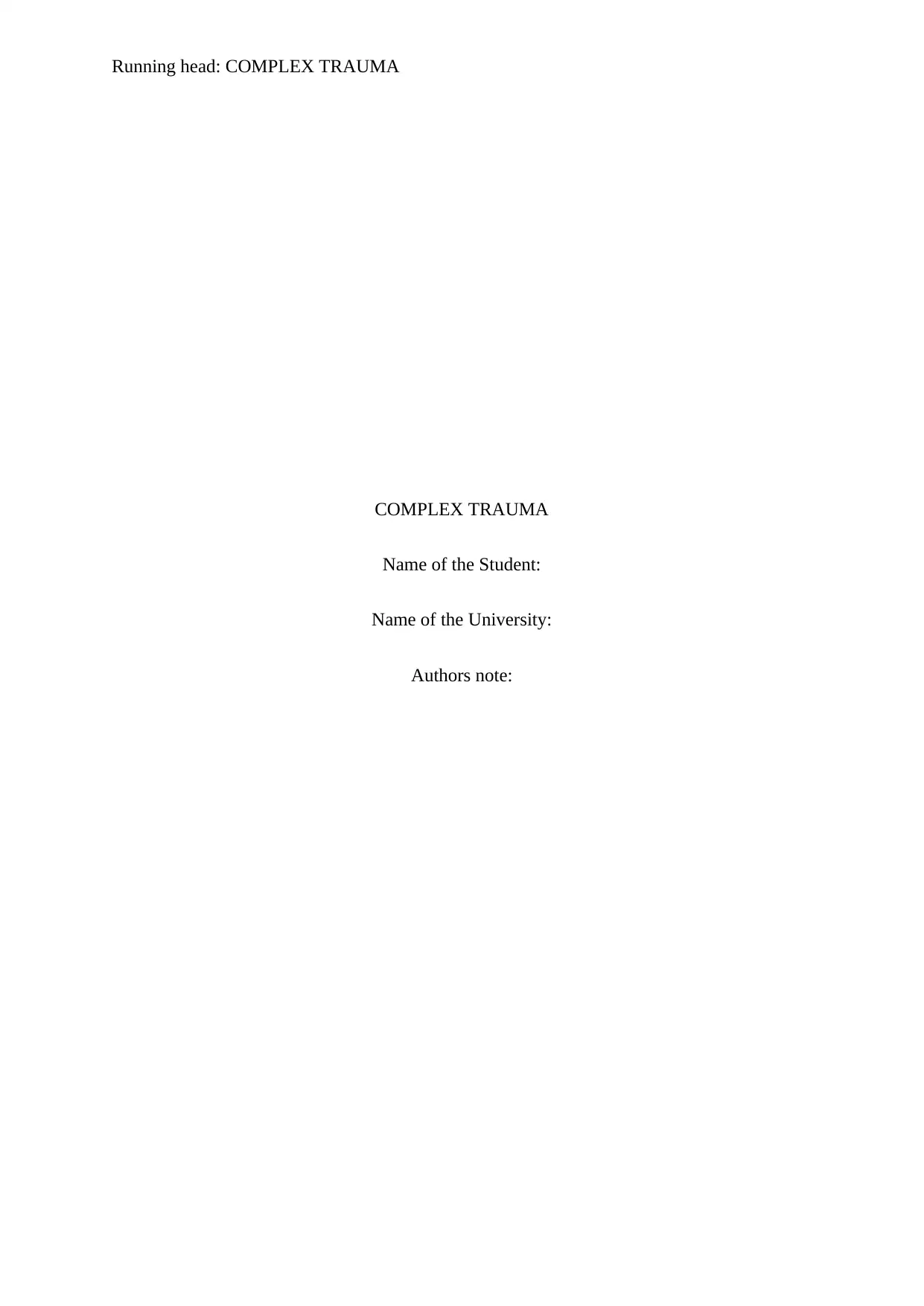
Running head: COMPLEX TRAUMA
COMPLEX TRAUMA
Name of the Student:
Name of the University:
Authors note:
COMPLEX TRAUMA
Name of the Student:
Name of the University:
Authors note:
Secure Best Marks with AI Grader
Need help grading? Try our AI Grader for instant feedback on your assignments.
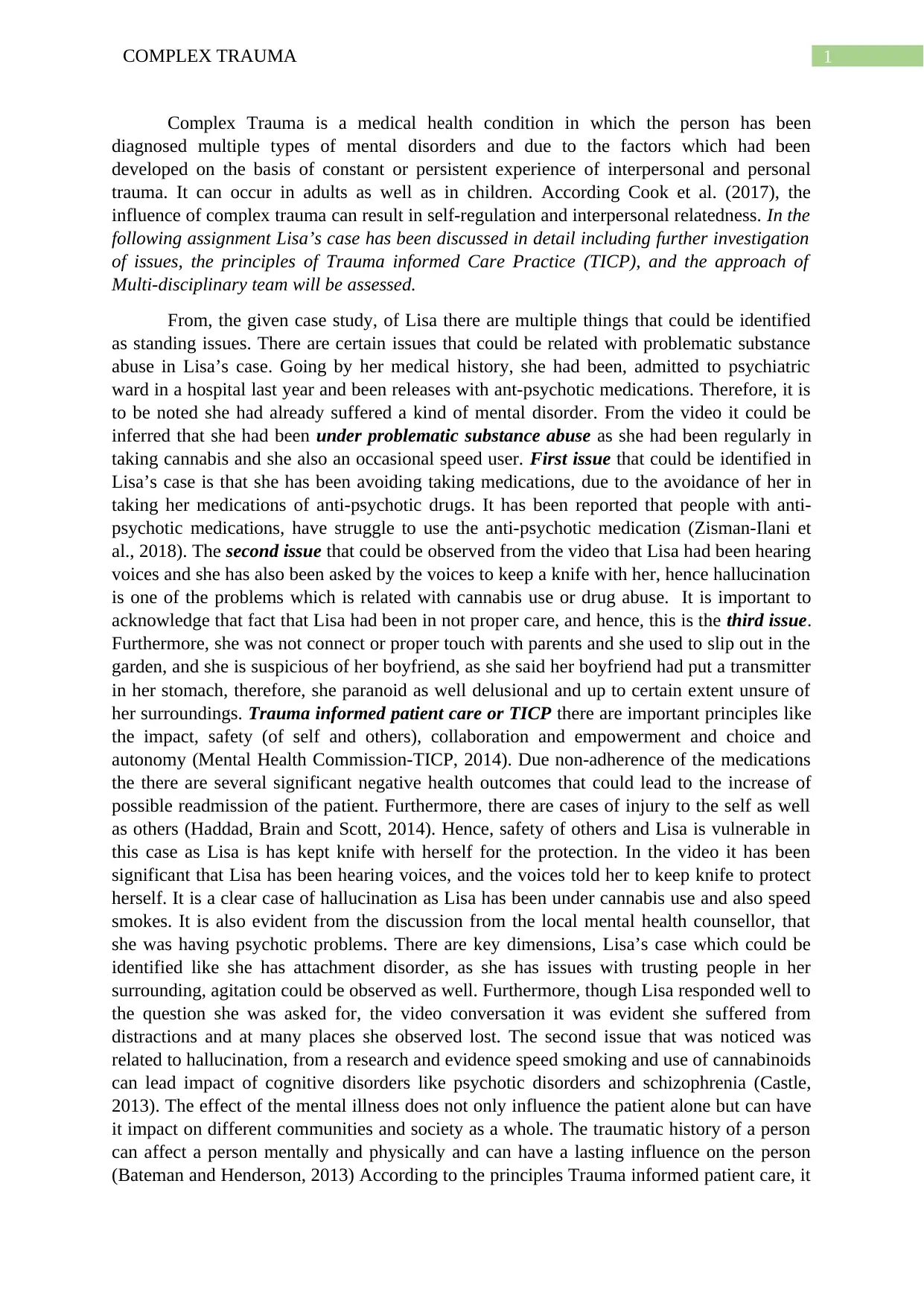
1COMPLEX TRAUMA
Complex Trauma is a medical health condition in which the person has been
diagnosed multiple types of mental disorders and due to the factors which had been
developed on the basis of constant or persistent experience of interpersonal and personal
trauma. It can occur in adults as well as in children. According Cook et al. (2017), the
influence of complex trauma can result in self-regulation and interpersonal relatedness. In the
following assignment Lisa’s case has been discussed in detail including further investigation
of issues, the principles of Trauma informed Care Practice (TICP), and the approach of
Multi-disciplinary team will be assessed.
From, the given case study, of Lisa there are multiple things that could be identified
as standing issues. There are certain issues that could be related with problematic substance
abuse in Lisa’s case. Going by her medical history, she had been, admitted to psychiatric
ward in a hospital last year and been releases with ant-psychotic medications. Therefore, it is
to be noted she had already suffered a kind of mental disorder. From the video it could be
inferred that she had been under problematic substance abuse as she had been regularly in
taking cannabis and she also an occasional speed user. First issue that could be identified in
Lisa’s case is that she has been avoiding taking medications, due to the avoidance of her in
taking her medications of anti-psychotic drugs. It has been reported that people with anti-
psychotic medications, have struggle to use the anti-psychotic medication (Zisman-Ilani et
al., 2018). The second issue that could be observed from the video that Lisa had been hearing
voices and she has also been asked by the voices to keep a knife with her, hence hallucination
is one of the problems which is related with cannabis use or drug abuse. It is important to
acknowledge that fact that Lisa had been in not proper care, and hence, this is the third issue.
Furthermore, she was not connect or proper touch with parents and she used to slip out in the
garden, and she is suspicious of her boyfriend, as she said her boyfriend had put a transmitter
in her stomach, therefore, she paranoid as well delusional and up to certain extent unsure of
her surroundings. Trauma informed patient care or TICP there are important principles like
the impact, safety (of self and others), collaboration and empowerment and choice and
autonomy (Mental Health Commission-TICP, 2014). Due non-adherence of the medications
the there are several significant negative health outcomes that could lead to the increase of
possible readmission of the patient. Furthermore, there are cases of injury to the self as well
as others (Haddad, Brain and Scott, 2014). Hence, safety of others and Lisa is vulnerable in
this case as Lisa is has kept knife with herself for the protection. In the video it has been
significant that Lisa has been hearing voices, and the voices told her to keep knife to protect
herself. It is a clear case of hallucination as Lisa has been under cannabis use and also speed
smokes. It is also evident from the discussion from the local mental health counsellor, that
she was having psychotic problems. There are key dimensions, Lisa’s case which could be
identified like she has attachment disorder, as she has issues with trusting people in her
surrounding, agitation could be observed as well. Furthermore, though Lisa responded well to
the question she was asked for, the video conversation it was evident she suffered from
distractions and at many places she observed lost. The second issue that was noticed was
related to hallucination, from a research and evidence speed smoking and use of cannabinoids
can lead impact of cognitive disorders like psychotic disorders and schizophrenia (Castle,
2013). The effect of the mental illness does not only influence the patient alone but can have
it impact on different communities and society as a whole. The traumatic history of a person
can affect a person mentally and physically and can have a lasting influence on the person
(Bateman and Henderson, 2013) According to the principles Trauma informed patient care, it
Complex Trauma is a medical health condition in which the person has been
diagnosed multiple types of mental disorders and due to the factors which had been
developed on the basis of constant or persistent experience of interpersonal and personal
trauma. It can occur in adults as well as in children. According Cook et al. (2017), the
influence of complex trauma can result in self-regulation and interpersonal relatedness. In the
following assignment Lisa’s case has been discussed in detail including further investigation
of issues, the principles of Trauma informed Care Practice (TICP), and the approach of
Multi-disciplinary team will be assessed.
From, the given case study, of Lisa there are multiple things that could be identified
as standing issues. There are certain issues that could be related with problematic substance
abuse in Lisa’s case. Going by her medical history, she had been, admitted to psychiatric
ward in a hospital last year and been releases with ant-psychotic medications. Therefore, it is
to be noted she had already suffered a kind of mental disorder. From the video it could be
inferred that she had been under problematic substance abuse as she had been regularly in
taking cannabis and she also an occasional speed user. First issue that could be identified in
Lisa’s case is that she has been avoiding taking medications, due to the avoidance of her in
taking her medications of anti-psychotic drugs. It has been reported that people with anti-
psychotic medications, have struggle to use the anti-psychotic medication (Zisman-Ilani et
al., 2018). The second issue that could be observed from the video that Lisa had been hearing
voices and she has also been asked by the voices to keep a knife with her, hence hallucination
is one of the problems which is related with cannabis use or drug abuse. It is important to
acknowledge that fact that Lisa had been in not proper care, and hence, this is the third issue.
Furthermore, she was not connect or proper touch with parents and she used to slip out in the
garden, and she is suspicious of her boyfriend, as she said her boyfriend had put a transmitter
in her stomach, therefore, she paranoid as well delusional and up to certain extent unsure of
her surroundings. Trauma informed patient care or TICP there are important principles like
the impact, safety (of self and others), collaboration and empowerment and choice and
autonomy (Mental Health Commission-TICP, 2014). Due non-adherence of the medications
the there are several significant negative health outcomes that could lead to the increase of
possible readmission of the patient. Furthermore, there are cases of injury to the self as well
as others (Haddad, Brain and Scott, 2014). Hence, safety of others and Lisa is vulnerable in
this case as Lisa is has kept knife with herself for the protection. In the video it has been
significant that Lisa has been hearing voices, and the voices told her to keep knife to protect
herself. It is a clear case of hallucination as Lisa has been under cannabis use and also speed
smokes. It is also evident from the discussion from the local mental health counsellor, that
she was having psychotic problems. There are key dimensions, Lisa’s case which could be
identified like she has attachment disorder, as she has issues with trusting people in her
surrounding, agitation could be observed as well. Furthermore, though Lisa responded well to
the question she was asked for, the video conversation it was evident she suffered from
distractions and at many places she observed lost. The second issue that was noticed was
related to hallucination, from a research and evidence speed smoking and use of cannabinoids
can lead impact of cognitive disorders like psychotic disorders and schizophrenia (Castle,
2013). The effect of the mental illness does not only influence the patient alone but can have
it impact on different communities and society as a whole. The traumatic history of a person
can affect a person mentally and physically and can have a lasting influence on the person
(Bateman and Henderson, 2013) According to the principles Trauma informed patient care, it
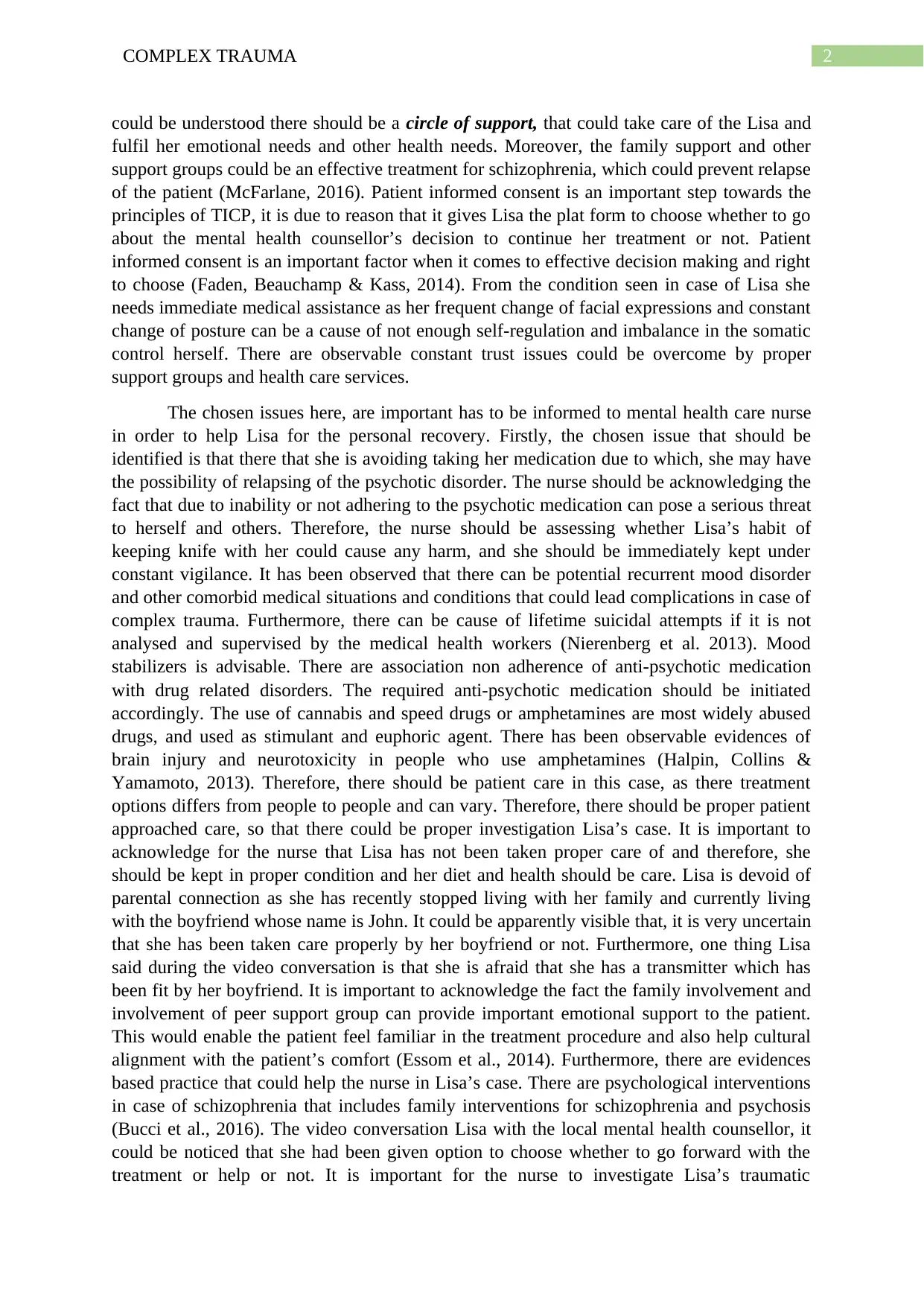
2COMPLEX TRAUMA
could be understood there should be a circle of support, that could take care of the Lisa and
fulfil her emotional needs and other health needs. Moreover, the family support and other
support groups could be an effective treatment for schizophrenia, which could prevent relapse
of the patient (McFarlane, 2016). Patient informed consent is an important step towards the
principles of TICP, it is due to reason that it gives Lisa the plat form to choose whether to go
about the mental health counsellor’s decision to continue her treatment or not. Patient
informed consent is an important factor when it comes to effective decision making and right
to choose (Faden, Beauchamp & Kass, 2014). From the condition seen in case of Lisa she
needs immediate medical assistance as her frequent change of facial expressions and constant
change of posture can be a cause of not enough self-regulation and imbalance in the somatic
control herself. There are observable constant trust issues could be overcome by proper
support groups and health care services.
The chosen issues here, are important has to be informed to mental health care nurse
in order to help Lisa for the personal recovery. Firstly, the chosen issue that should be
identified is that there that she is avoiding taking her medication due to which, she may have
the possibility of relapsing of the psychotic disorder. The nurse should be acknowledging the
fact that due to inability or not adhering to the psychotic medication can pose a serious threat
to herself and others. Therefore, the nurse should be assessing whether Lisa’s habit of
keeping knife with her could cause any harm, and she should be immediately kept under
constant vigilance. It has been observed that there can be potential recurrent mood disorder
and other comorbid medical situations and conditions that could lead complications in case of
complex trauma. Furthermore, there can be cause of lifetime suicidal attempts if it is not
analysed and supervised by the medical health workers (Nierenberg et al. 2013). Mood
stabilizers is advisable. There are association non adherence of anti-psychotic medication
with drug related disorders. The required anti-psychotic medication should be initiated
accordingly. The use of cannabis and speed drugs or amphetamines are most widely abused
drugs, and used as stimulant and euphoric agent. There has been observable evidences of
brain injury and neurotoxicity in people who use amphetamines (Halpin, Collins &
Yamamoto, 2013). Therefore, there should be patient care in this case, as there treatment
options differs from people to people and can vary. Therefore, there should be proper patient
approached care, so that there could be proper investigation Lisa’s case. It is important to
acknowledge for the nurse that Lisa has not been taken proper care of and therefore, she
should be kept in proper condition and her diet and health should be care. Lisa is devoid of
parental connection as she has recently stopped living with her family and currently living
with the boyfriend whose name is John. It could be apparently visible that, it is very uncertain
that she has been taken care properly by her boyfriend or not. Furthermore, one thing Lisa
said during the video conversation is that she is afraid that she has a transmitter which has
been fit by her boyfriend. It is important to acknowledge the fact the family involvement and
involvement of peer support group can provide important emotional support to the patient.
This would enable the patient feel familiar in the treatment procedure and also help cultural
alignment with the patient’s comfort (Essom et al., 2014). Furthermore, there are evidences
based practice that could help the nurse in Lisa’s case. There are psychological interventions
in case of schizophrenia that includes family interventions for schizophrenia and psychosis
(Bucci et al., 2016). The video conversation Lisa with the local mental health counsellor, it
could be noticed that she had been given option to choose whether to go forward with the
treatment or help or not. It is important for the nurse to investigate Lisa’s traumatic
could be understood there should be a circle of support, that could take care of the Lisa and
fulfil her emotional needs and other health needs. Moreover, the family support and other
support groups could be an effective treatment for schizophrenia, which could prevent relapse
of the patient (McFarlane, 2016). Patient informed consent is an important step towards the
principles of TICP, it is due to reason that it gives Lisa the plat form to choose whether to go
about the mental health counsellor’s decision to continue her treatment or not. Patient
informed consent is an important factor when it comes to effective decision making and right
to choose (Faden, Beauchamp & Kass, 2014). From the condition seen in case of Lisa she
needs immediate medical assistance as her frequent change of facial expressions and constant
change of posture can be a cause of not enough self-regulation and imbalance in the somatic
control herself. There are observable constant trust issues could be overcome by proper
support groups and health care services.
The chosen issues here, are important has to be informed to mental health care nurse
in order to help Lisa for the personal recovery. Firstly, the chosen issue that should be
identified is that there that she is avoiding taking her medication due to which, she may have
the possibility of relapsing of the psychotic disorder. The nurse should be acknowledging the
fact that due to inability or not adhering to the psychotic medication can pose a serious threat
to herself and others. Therefore, the nurse should be assessing whether Lisa’s habit of
keeping knife with her could cause any harm, and she should be immediately kept under
constant vigilance. It has been observed that there can be potential recurrent mood disorder
and other comorbid medical situations and conditions that could lead complications in case of
complex trauma. Furthermore, there can be cause of lifetime suicidal attempts if it is not
analysed and supervised by the medical health workers (Nierenberg et al. 2013). Mood
stabilizers is advisable. There are association non adherence of anti-psychotic medication
with drug related disorders. The required anti-psychotic medication should be initiated
accordingly. The use of cannabis and speed drugs or amphetamines are most widely abused
drugs, and used as stimulant and euphoric agent. There has been observable evidences of
brain injury and neurotoxicity in people who use amphetamines (Halpin, Collins &
Yamamoto, 2013). Therefore, there should be patient care in this case, as there treatment
options differs from people to people and can vary. Therefore, there should be proper patient
approached care, so that there could be proper investigation Lisa’s case. It is important to
acknowledge for the nurse that Lisa has not been taken proper care of and therefore, she
should be kept in proper condition and her diet and health should be care. Lisa is devoid of
parental connection as she has recently stopped living with her family and currently living
with the boyfriend whose name is John. It could be apparently visible that, it is very uncertain
that she has been taken care properly by her boyfriend or not. Furthermore, one thing Lisa
said during the video conversation is that she is afraid that she has a transmitter which has
been fit by her boyfriend. It is important to acknowledge the fact the family involvement and
involvement of peer support group can provide important emotional support to the patient.
This would enable the patient feel familiar in the treatment procedure and also help cultural
alignment with the patient’s comfort (Essom et al., 2014). Furthermore, there are evidences
based practice that could help the nurse in Lisa’s case. There are psychological interventions
in case of schizophrenia that includes family interventions for schizophrenia and psychosis
(Bucci et al., 2016). The video conversation Lisa with the local mental health counsellor, it
could be noticed that she had been given option to choose whether to go forward with the
treatment or help or not. It is important for the nurse to investigate Lisa’s traumatic
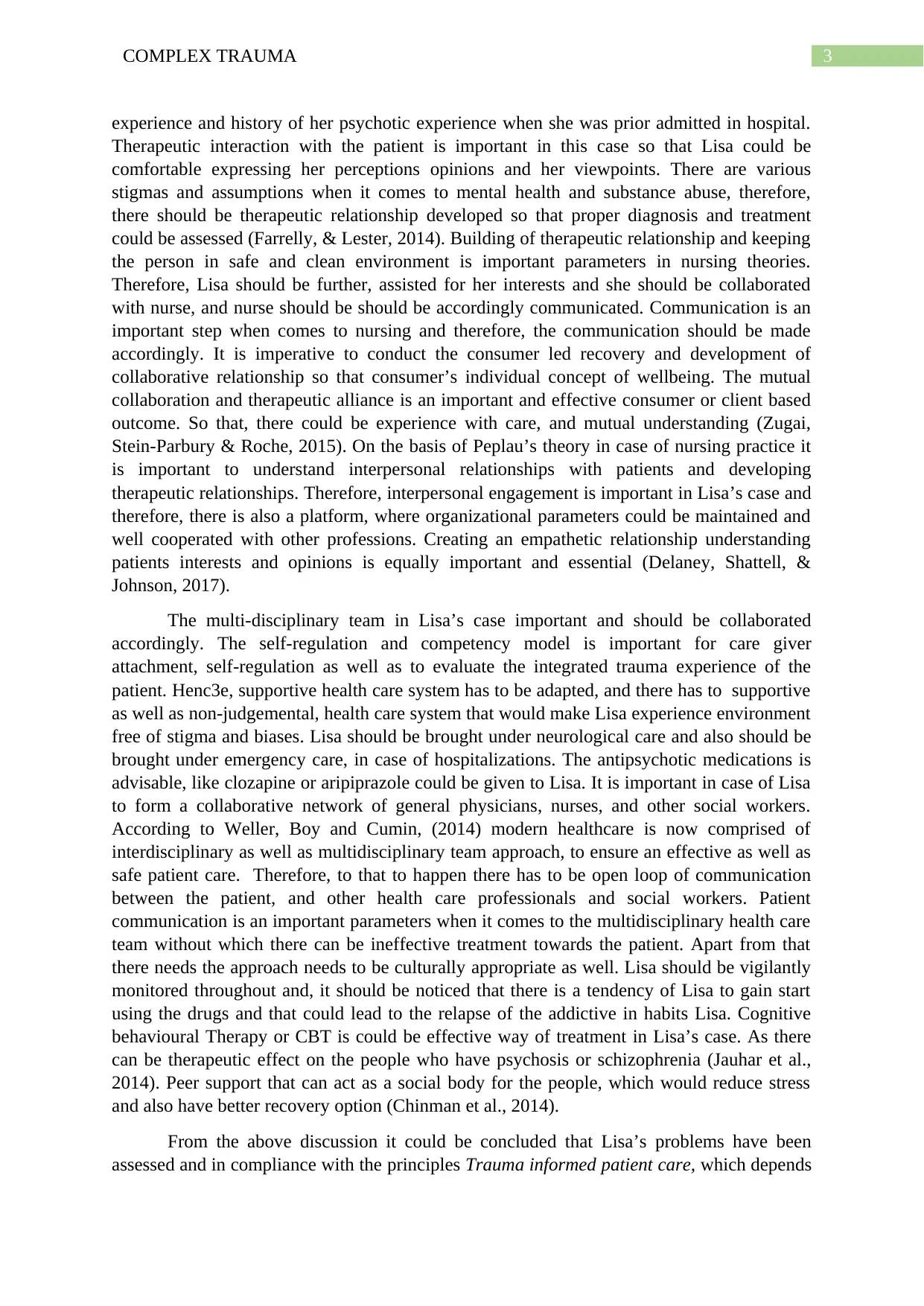
3COMPLEX TRAUMA
experience and history of her psychotic experience when she was prior admitted in hospital.
Therapeutic interaction with the patient is important in this case so that Lisa could be
comfortable expressing her perceptions opinions and her viewpoints. There are various
stigmas and assumptions when it comes to mental health and substance abuse, therefore,
there should be therapeutic relationship developed so that proper diagnosis and treatment
could be assessed (Farrelly, & Lester, 2014). Building of therapeutic relationship and keeping
the person in safe and clean environment is important parameters in nursing theories.
Therefore, Lisa should be further, assisted for her interests and she should be collaborated
with nurse, and nurse should be should be accordingly communicated. Communication is an
important step when comes to nursing and therefore, the communication should be made
accordingly. It is imperative to conduct the consumer led recovery and development of
collaborative relationship so that consumer’s individual concept of wellbeing. The mutual
collaboration and therapeutic alliance is an important and effective consumer or client based
outcome. So that, there could be experience with care, and mutual understanding (Zugai,
Stein-Parbury & Roche, 2015). On the basis of Peplau’s theory in case of nursing practice it
is important to understand interpersonal relationships with patients and developing
therapeutic relationships. Therefore, interpersonal engagement is important in Lisa’s case and
therefore, there is also a platform, where organizational parameters could be maintained and
well cooperated with other professions. Creating an empathetic relationship understanding
patients interests and opinions is equally important and essential (Delaney, Shattell, &
Johnson, 2017).
The multi-disciplinary team in Lisa’s case important and should be collaborated
accordingly. The self-regulation and competency model is important for care giver
attachment, self-regulation as well as to evaluate the integrated trauma experience of the
patient. Henc3e, supportive health care system has to be adapted, and there has to supportive
as well as non-judgemental, health care system that would make Lisa experience environment
free of stigma and biases. Lisa should be brought under neurological care and also should be
brought under emergency care, in case of hospitalizations. The antipsychotic medications is
advisable, like clozapine or aripiprazole could be given to Lisa. It is important in case of Lisa
to form a collaborative network of general physicians, nurses, and other social workers.
According to Weller, Boy and Cumin, (2014) modern healthcare is now comprised of
interdisciplinary as well as multidisciplinary team approach, to ensure an effective as well as
safe patient care. Therefore, to that to happen there has to be open loop of communication
between the patient, and other health care professionals and social workers. Patient
communication is an important parameters when it comes to the multidisciplinary health care
team without which there can be ineffective treatment towards the patient. Apart from that
there needs the approach needs to be culturally appropriate as well. Lisa should be vigilantly
monitored throughout and, it should be noticed that there is a tendency of Lisa to gain start
using the drugs and that could lead to the relapse of the addictive in habits Lisa. Cognitive
behavioural Therapy or CBT is could be effective way of treatment in Lisa’s case. As there
can be therapeutic effect on the people who have psychosis or schizophrenia (Jauhar et al.,
2014). Peer support that can act as a social body for the people, which would reduce stress
and also have better recovery option (Chinman et al., 2014).
From the above discussion it could be concluded that Lisa’s problems have been
assessed and in compliance with the principles Trauma informed patient care, which depends
experience and history of her psychotic experience when she was prior admitted in hospital.
Therapeutic interaction with the patient is important in this case so that Lisa could be
comfortable expressing her perceptions opinions and her viewpoints. There are various
stigmas and assumptions when it comes to mental health and substance abuse, therefore,
there should be therapeutic relationship developed so that proper diagnosis and treatment
could be assessed (Farrelly, & Lester, 2014). Building of therapeutic relationship and keeping
the person in safe and clean environment is important parameters in nursing theories.
Therefore, Lisa should be further, assisted for her interests and she should be collaborated
with nurse, and nurse should be should be accordingly communicated. Communication is an
important step when comes to nursing and therefore, the communication should be made
accordingly. It is imperative to conduct the consumer led recovery and development of
collaborative relationship so that consumer’s individual concept of wellbeing. The mutual
collaboration and therapeutic alliance is an important and effective consumer or client based
outcome. So that, there could be experience with care, and mutual understanding (Zugai,
Stein-Parbury & Roche, 2015). On the basis of Peplau’s theory in case of nursing practice it
is important to understand interpersonal relationships with patients and developing
therapeutic relationships. Therefore, interpersonal engagement is important in Lisa’s case and
therefore, there is also a platform, where organizational parameters could be maintained and
well cooperated with other professions. Creating an empathetic relationship understanding
patients interests and opinions is equally important and essential (Delaney, Shattell, &
Johnson, 2017).
The multi-disciplinary team in Lisa’s case important and should be collaborated
accordingly. The self-regulation and competency model is important for care giver
attachment, self-regulation as well as to evaluate the integrated trauma experience of the
patient. Henc3e, supportive health care system has to be adapted, and there has to supportive
as well as non-judgemental, health care system that would make Lisa experience environment
free of stigma and biases. Lisa should be brought under neurological care and also should be
brought under emergency care, in case of hospitalizations. The antipsychotic medications is
advisable, like clozapine or aripiprazole could be given to Lisa. It is important in case of Lisa
to form a collaborative network of general physicians, nurses, and other social workers.
According to Weller, Boy and Cumin, (2014) modern healthcare is now comprised of
interdisciplinary as well as multidisciplinary team approach, to ensure an effective as well as
safe patient care. Therefore, to that to happen there has to be open loop of communication
between the patient, and other health care professionals and social workers. Patient
communication is an important parameters when it comes to the multidisciplinary health care
team without which there can be ineffective treatment towards the patient. Apart from that
there needs the approach needs to be culturally appropriate as well. Lisa should be vigilantly
monitored throughout and, it should be noticed that there is a tendency of Lisa to gain start
using the drugs and that could lead to the relapse of the addictive in habits Lisa. Cognitive
behavioural Therapy or CBT is could be effective way of treatment in Lisa’s case. As there
can be therapeutic effect on the people who have psychosis or schizophrenia (Jauhar et al.,
2014). Peer support that can act as a social body for the people, which would reduce stress
and also have better recovery option (Chinman et al., 2014).
From the above discussion it could be concluded that Lisa’s problems have been
assessed and in compliance with the principles Trauma informed patient care, which depends
Secure Best Marks with AI Grader
Need help grading? Try our AI Grader for instant feedback on your assignments.
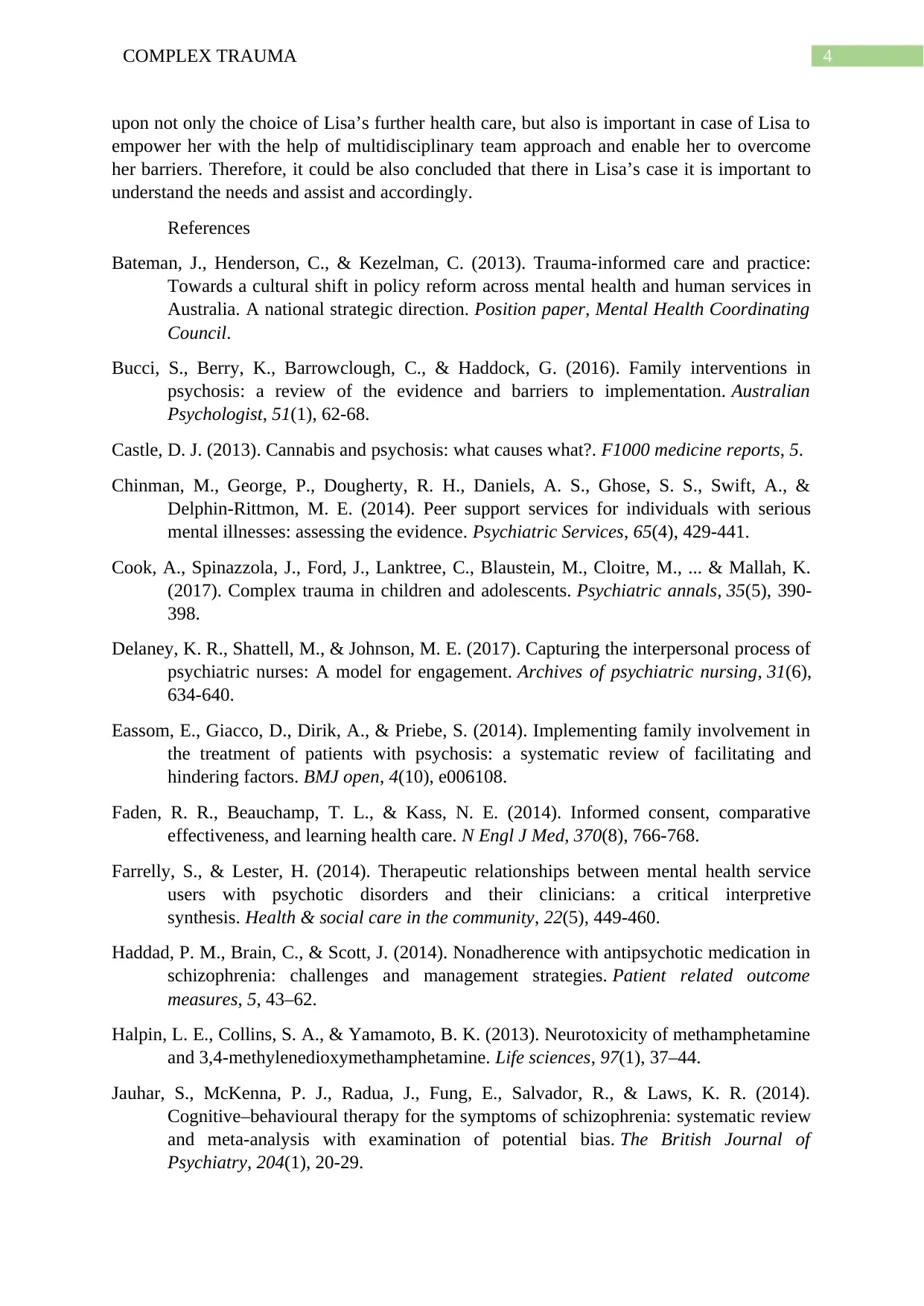
4COMPLEX TRAUMA
upon not only the choice of Lisa’s further health care, but also is important in case of Lisa to
empower her with the help of multidisciplinary team approach and enable her to overcome
her barriers. Therefore, it could be also concluded that there in Lisa’s case it is important to
understand the needs and assist and accordingly.
References
Bateman, J., Henderson, C., & Kezelman, C. (2013). Trauma-informed care and practice:
Towards a cultural shift in policy reform across mental health and human services in
Australia. A national strategic direction. Position paper, Mental Health Coordinating
Council.
Bucci, S., Berry, K., Barrowclough, C., & Haddock, G. (2016). Family interventions in
psychosis: a review of the evidence and barriers to implementation. Australian
Psychologist, 51(1), 62-68.
Castle, D. J. (2013). Cannabis and psychosis: what causes what?. F1000 medicine reports, 5.
Chinman, M., George, P., Dougherty, R. H., Daniels, A. S., Ghose, S. S., Swift, A., &
Delphin-Rittmon, M. E. (2014). Peer support services for individuals with serious
mental illnesses: assessing the evidence. Psychiatric Services, 65(4), 429-441.
Cook, A., Spinazzola, J., Ford, J., Lanktree, C., Blaustein, M., Cloitre, M., ... & Mallah, K.
(2017). Complex trauma in children and adolescents. Psychiatric annals, 35(5), 390-
398.
Delaney, K. R., Shattell, M., & Johnson, M. E. (2017). Capturing the interpersonal process of
psychiatric nurses: A model for engagement. Archives of psychiatric nursing, 31(6),
634-640.
Eassom, E., Giacco, D., Dirik, A., & Priebe, S. (2014). Implementing family involvement in
the treatment of patients with psychosis: a systematic review of facilitating and
hindering factors. BMJ open, 4(10), e006108.
Faden, R. R., Beauchamp, T. L., & Kass, N. E. (2014). Informed consent, comparative
effectiveness, and learning health care. N Engl J Med, 370(8), 766-768.
Farrelly, S., & Lester, H. (2014). Therapeutic relationships between mental health service
users with psychotic disorders and their clinicians: a critical interpretive
synthesis. Health & social care in the community, 22(5), 449-460.
Haddad, P. M., Brain, C., & Scott, J. (2014). Nonadherence with antipsychotic medication in
schizophrenia: challenges and management strategies. Patient related outcome
measures, 5, 43–62.
Halpin, L. E., Collins, S. A., & Yamamoto, B. K. (2013). Neurotoxicity of methamphetamine
and 3,4-methylenedioxymethamphetamine. Life sciences, 97(1), 37–44.
Jauhar, S., McKenna, P. J., Radua, J., Fung, E., Salvador, R., & Laws, K. R. (2014).
Cognitive–behavioural therapy for the symptoms of schizophrenia: systematic review
and meta-analysis with examination of potential bias. The British Journal of
Psychiatry, 204(1), 20-29.
upon not only the choice of Lisa’s further health care, but also is important in case of Lisa to
empower her with the help of multidisciplinary team approach and enable her to overcome
her barriers. Therefore, it could be also concluded that there in Lisa’s case it is important to
understand the needs and assist and accordingly.
References
Bateman, J., Henderson, C., & Kezelman, C. (2013). Trauma-informed care and practice:
Towards a cultural shift in policy reform across mental health and human services in
Australia. A national strategic direction. Position paper, Mental Health Coordinating
Council.
Bucci, S., Berry, K., Barrowclough, C., & Haddock, G. (2016). Family interventions in
psychosis: a review of the evidence and barriers to implementation. Australian
Psychologist, 51(1), 62-68.
Castle, D. J. (2013). Cannabis and psychosis: what causes what?. F1000 medicine reports, 5.
Chinman, M., George, P., Dougherty, R. H., Daniels, A. S., Ghose, S. S., Swift, A., &
Delphin-Rittmon, M. E. (2014). Peer support services for individuals with serious
mental illnesses: assessing the evidence. Psychiatric Services, 65(4), 429-441.
Cook, A., Spinazzola, J., Ford, J., Lanktree, C., Blaustein, M., Cloitre, M., ... & Mallah, K.
(2017). Complex trauma in children and adolescents. Psychiatric annals, 35(5), 390-
398.
Delaney, K. R., Shattell, M., & Johnson, M. E. (2017). Capturing the interpersonal process of
psychiatric nurses: A model for engagement. Archives of psychiatric nursing, 31(6),
634-640.
Eassom, E., Giacco, D., Dirik, A., & Priebe, S. (2014). Implementing family involvement in
the treatment of patients with psychosis: a systematic review of facilitating and
hindering factors. BMJ open, 4(10), e006108.
Faden, R. R., Beauchamp, T. L., & Kass, N. E. (2014). Informed consent, comparative
effectiveness, and learning health care. N Engl J Med, 370(8), 766-768.
Farrelly, S., & Lester, H. (2014). Therapeutic relationships between mental health service
users with psychotic disorders and their clinicians: a critical interpretive
synthesis. Health & social care in the community, 22(5), 449-460.
Haddad, P. M., Brain, C., & Scott, J. (2014). Nonadherence with antipsychotic medication in
schizophrenia: challenges and management strategies. Patient related outcome
measures, 5, 43–62.
Halpin, L. E., Collins, S. A., & Yamamoto, B. K. (2013). Neurotoxicity of methamphetamine
and 3,4-methylenedioxymethamphetamine. Life sciences, 97(1), 37–44.
Jauhar, S., McKenna, P. J., Radua, J., Fung, E., Salvador, R., & Laws, K. R. (2014).
Cognitive–behavioural therapy for the symptoms of schizophrenia: systematic review
and meta-analysis with examination of potential bias. The British Journal of
Psychiatry, 204(1), 20-29.
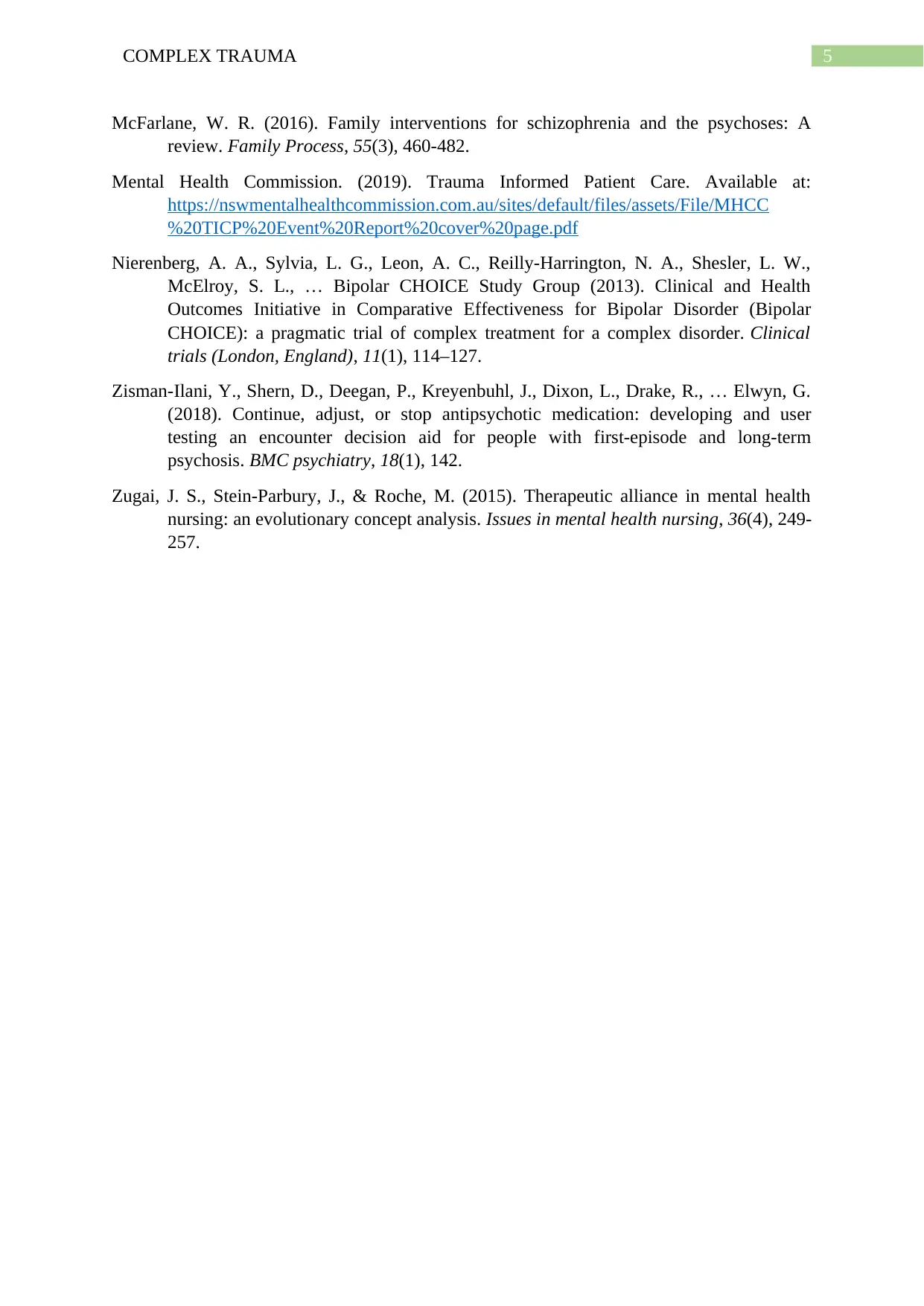
5COMPLEX TRAUMA
McFarlane, W. R. (2016). Family interventions for schizophrenia and the psychoses: A
review. Family Process, 55(3), 460-482.
Mental Health Commission. (2019). Trauma Informed Patient Care. Available at:
https://nswmentalhealthcommission.com.au/sites/default/files/assets/File/MHCC
%20TICP%20Event%20Report%20cover%20page.pdf
Nierenberg, A. A., Sylvia, L. G., Leon, A. C., Reilly-Harrington, N. A., Shesler, L. W.,
McElroy, S. L., … Bipolar CHOICE Study Group (2013). Clinical and Health
Outcomes Initiative in Comparative Effectiveness for Bipolar Disorder (Bipolar
CHOICE): a pragmatic trial of complex treatment for a complex disorder. Clinical
trials (London, England), 11(1), 114–127.
Zisman-Ilani, Y., Shern, D., Deegan, P., Kreyenbuhl, J., Dixon, L., Drake, R., … Elwyn, G.
(2018). Continue, adjust, or stop antipsychotic medication: developing and user
testing an encounter decision aid for people with first-episode and long-term
psychosis. BMC psychiatry, 18(1), 142.
Zugai, J. S., Stein-Parbury, J., & Roche, M. (2015). Therapeutic alliance in mental health
nursing: an evolutionary concept analysis. Issues in mental health nursing, 36(4), 249-
257.
McFarlane, W. R. (2016). Family interventions for schizophrenia and the psychoses: A
review. Family Process, 55(3), 460-482.
Mental Health Commission. (2019). Trauma Informed Patient Care. Available at:
https://nswmentalhealthcommission.com.au/sites/default/files/assets/File/MHCC
%20TICP%20Event%20Report%20cover%20page.pdf
Nierenberg, A. A., Sylvia, L. G., Leon, A. C., Reilly-Harrington, N. A., Shesler, L. W.,
McElroy, S. L., … Bipolar CHOICE Study Group (2013). Clinical and Health
Outcomes Initiative in Comparative Effectiveness for Bipolar Disorder (Bipolar
CHOICE): a pragmatic trial of complex treatment for a complex disorder. Clinical
trials (London, England), 11(1), 114–127.
Zisman-Ilani, Y., Shern, D., Deegan, P., Kreyenbuhl, J., Dixon, L., Drake, R., … Elwyn, G.
(2018). Continue, adjust, or stop antipsychotic medication: developing and user
testing an encounter decision aid for people with first-episode and long-term
psychosis. BMC psychiatry, 18(1), 142.
Zugai, J. S., Stein-Parbury, J., & Roche, M. (2015). Therapeutic alliance in mental health
nursing: an evolutionary concept analysis. Issues in mental health nursing, 36(4), 249-
257.
1 out of 6
Related Documents
Your All-in-One AI-Powered Toolkit for Academic Success.
+13062052269
info@desklib.com
Available 24*7 on WhatsApp / Email
![[object Object]](/_next/static/media/star-bottom.7253800d.svg)
Unlock your academic potential
© 2024 | Zucol Services PVT LTD | All rights reserved.





